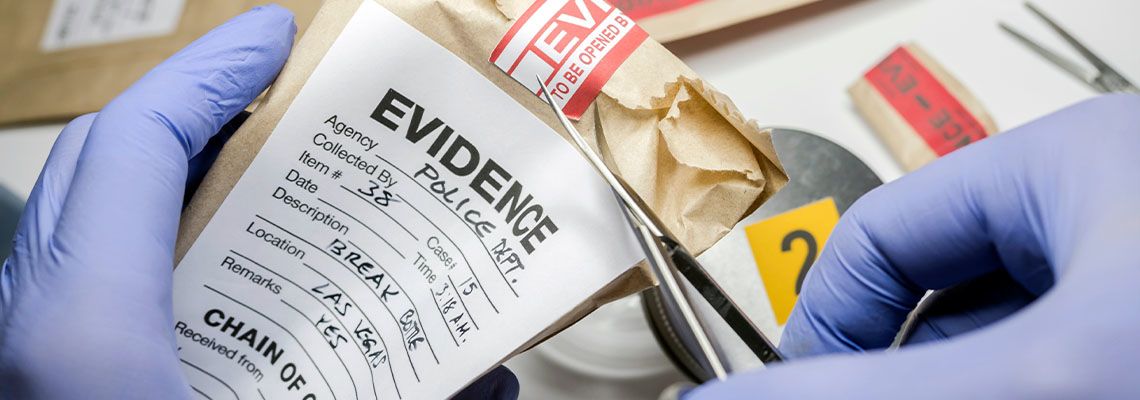
Understanding Evidence in a Criminal Trial
Most of us have probably watched courtroom dramas on TV where a defense attorney will rise and proclaim: “Objection, your honor, this evidence is not relevant.” Another version might be that the evidence is “immaterial” or perhaps “hearsay.” What, then, is admissible evidence in a trial? Evidence, after all, is what determines the outcome of the proceeding.
Evidence can come in many forms. There can be witnesses, video footage, audio recordings, digital evidence such as emails or text messages, physical objects such as weapons, scientific results such as blood or DNA tests, photographs, and even graphs or charts prepared to explain what happened.
Prosecutors will try to assemble the most compelling pieces of evidence they can, and defense attorneys will challenge the evidence to the greatest extent possible while introducing evidence of their own to exonerate their clients.
If you are facing a criminal charge or under investigation in or around Corpus Christi, Dallas, or Fort Worth, Texas, reach out to an attorney as soon as you can. As criminal defense attorneys at The Torres Law Firm, we will strive to protect your rights and your freedom. We have experience in both state and federal courtrooms, and you can rest assured that we will fight for the best possible result no matter what charges you face. The Torres Attorneys are on your side.
What Is Evidence?
Let’s take the example of driving under the influence (DUI) charge. Evidence may include, but is not limited to, observations by the arresting office, the results of a breathalyzer or blood test, and any statements you made. There may also be witnesses who observed your allegedly impaired driving. All of this evidence can be challenged on various grounds, but the point is that prosecutors will attempt to assemble the most complete package of evidence available.
The types of evidence can typically be broken down into these categories:
TESTIMONIAL: Witnesses or expert witnesses, depending on the nature and circumstances of the charge, may be called in to offer their testimony.
DOCUMENTARY: This category includes not only written documents, but also digital, video, audio, and more, perhaps even social media posts.
TANGIBLE OR PHYSICAL: This is a version of “the smoking gun” in some charges—a weapon or other object that judges and juries can hold and inspect.
DEMONSTRATIVE: Here, the charts and graphs mentioned above are employed to illustrate what allegedly happened.
Admissibility of Evidence
The Texas Rules of Evidence govern what is and isn’t admissible in a trial. To be admissible, the evidence must generally be:
RELEVANT: This means relating to the case at hand in a way that makes a fact more or less probable.
MATERIAL: In addition to being relevant, admissible evidence must also be material to the case; i.e., it must have a direct bearing.
AUTHENTIC: This refers to showing that the evidence is real and not forged or fake. Evidence can be authenticated by a witness. Some forms of documentary evidence are deemed self-authenticating, such as a video of what happened.
NOT EXCLUSIONARY: Some evidence may not be admitted because it is privileged, such as discussions between client and attorney, client and clergy, client and spouse, and doctor-patient communications.
NOT HEARSAY: This refers to out-of-court statements. For instance, in a non-court setting, someone asserts that another person committed a robbery or other crime. This is considered hearsay and cannot generally be admitted in court. However, a defendant’s out-of-court statements are not considered hearsay and can be admitted.
Direct vs. Circumstantial Evidence
In a trial, both direct and circumstantial evidence may be introduced. Direct evidence can be the testimony of a witness who viewed the totality of the crime being committed. For instance, a driver in a parked car could witness an assault and robbery on the street where he or she was parked. That could be direct evidence.
But if, on the other hand, someone driving by the scene saw only a victim lying on the sidewalk and another person running away with a purse or other object in their possession, that would be circumstantial. Both direct and/or circumstantial evidence can be enough to convict.
Turn to Trusted Defense Attorneys
If you’re facing a criminal investigation or charge in or around Corpus Christi, Dallas or Fort Worth, contact us immediately at The Torres Law Firm. We will mount an aggressive defense for you to protect your rights and freedom. Too much is at stake, so reach out to us in confidence that we’ll fight for the best possible outcome for you.

